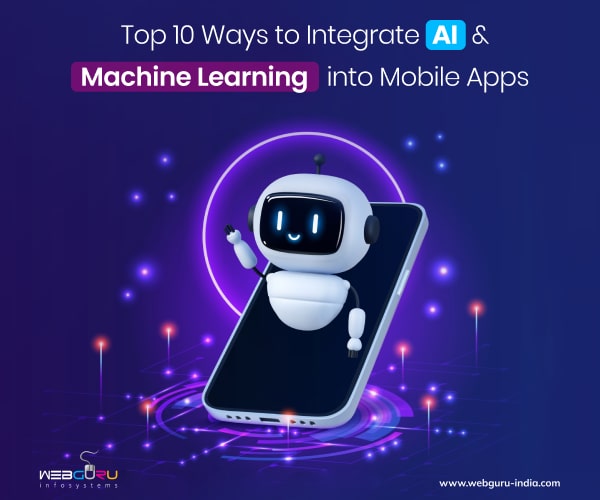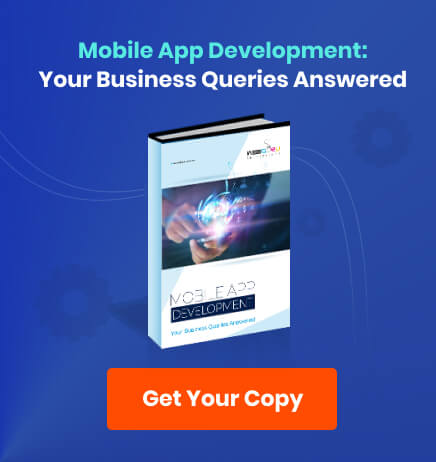Home Blog Mobile App Development How to Integrate AI and Machine Learning into Mobile Apps
How to Integrate AI and Machine Learning into Mobile Apps
- 20 Jun / 2024
- 3,107 views
- 8 Min Read

With user expectations soaring higher than ever, standing out in the app market requires intelligence and customization beyond simple functionality. Here, integrating AI and machine learning in your mobile apps can greatly improve user experience and engagement, whether you’re an established tech giant or an emerging startup. This blog explores the top strategies for leveraging AI and ML in mobile app development, transforming your app into a smart, personalized tool that meets user needs intuitively. Find out how these innovative technologies can provide your app with a competitive advantage.
With over 8 million apps available on both the iOS and Android platforms, users demand a constantly enhanced user experience. This creates a need for agencies offering mobile app development services to find new methods for increasing satisfaction among users and staying competitive in the market. This is precisely where artificial intelligence and machine learning come into play. These technologies are pushing apps to be more than just useful tools. They are evolving into smart companions that can predict what users want, tailor experiences for them, and provide unmatched levels of engagement.
According to a report published by Fortune Business Insights™, the global artificial intelligence market is projected to reach USD 266.92 billion by 2027, with an impressive CAGR of 33.2%. In 2019, it was expected to be worth USD 27.23 billion. Therefore, implementing AI and ML in mobile apps is crucial for enhancing brand presence on digital platforms. In this blog post, we will explore some of the top ways that artificial intelligence and machine learning can be integrated into mobile app development.
Top 10 Ways to Integrate AI and Machine Learning into Mobile Apps
Here are the best ways to leverage artificial intelligence and machine learning for an edge over the competition:
#1 Determine the Types of Issues That Mobile Apps with ML and AI Can Address
To understand the problems that AI and ML can solve in your mobile apps, it is important to know what they are capable of doing. Machine learning as well as artificial intelligence have the possibility of improving present solutions or providing new functionalities. However, their use must be understood before you apply them. Every mobile app development company in India wishing to utilize advanced technologies to stay competitive in the global market should first understand these abilities. These companies have the opportunity to enjoy advantages such as improved security, predictive analysis, efficient company functioning, and custom user dealings by effectively incorporating AI and ML.
To comprehend the effectiveness of mobile AI apps:
• Consult with AI specialists and go through online resources for information.
• Explore the tools and technologies available to you to expand your knowledge.
• Analyze case studies from related industries to learn how other businesses have effectively incorporated AI and ML into their offerings.
Knowing these abilities helps you recognize the particular spots where AI and ML can give maximum benefits to your mobile app. It aids in setting clear targets, matching technological investments with business aims, and making certain that the incorporation of AI and ML improves the overall user experience and functionality of your app.
#2 Create a Plan & Budget
The next step that you need to take is to roll out your plan for implementing artificial intelligence and machine learning. One of the most important aspects of this implementation is determining how much you are willing to pay for it. Remember, how much you can do will depend on your budget. You might be able to entirely redesign your app at once if you don’t have any financial restrictions. It is advisable to create a planned approach for your AI and ML integration, nonetheless, irrespective of your financial constraints. This will allow you to prioritize your adjustments after you have determined your budget and identified the problem areas.
Also, read our latest blog What Are The Best Practices For Designing An Effective Logo?
#3 Select Relevant AI/ML Models
Selecting appropriate AI and ML models depends on your application’s needs. For example, if mobile app developers have to deal with tasks of natural language processing (NLP), models such as recurrent neural networks (RNNs) or transformers are fitting because they can comprehend and create human language effectively. In contrast, convolutional neural networks (CNNs) are most useful for image-based jobs like identifying pictures, finding objects in them, and recognizing faces, etc. Convolutional neural networks are specifically crafted to learn spatial hierarchies of features from images in an automatic and adaptive manner, which is well-suited for visual recognition tasks.
Also, the use of existing frameworks and models that are pre-trained can speed up the development process quite a bit. TensorFlow, PyTorch, and scikit-learn tools come with large libraries and ready-made models that you can adjust to fit your requirements. These structures create strong settings for training and launching models, thus saving much time and effort in development.
#4 Leverage Cloud AI Services
By leveraging cloud-based AI services, integrating AI into your mobile app becomes seamless. Platforms such as Google Cloud AI, AWS AI, and Microsoft Azure AI provide pre-built models and APIs for managing various functions, such as speech recognition, image analysis, and natural language understanding.
#5 Focus on Data Quality
High-quality data is very important for the proper functioning of AI and ML models. For any mobile app development company in India, making sure they have precise and related data is necessary. They need to put strong systems into place that will keep updating and improving datasets all the time so as to keep up the accuracy as well as the performance of AI or ML models over a period of time. These companies, by improving their data quality and governance practices, can ensure that the AI-powered applications provide accurate insights, personalized user experiences, and efficient solutions.
#6 Optimize for Performance
AI and ML processes, especially on mobile devices, can be resource-intensive. To optimize efficiency, techniques like model quantization, pruning, and employing lightweight models (e.g., MobileNet) can be used. Offloading complex computations to the cloud should also be considered to reduce device burden and improve performance.
#7 Ensure Privacy and Security
AI/ML requires strict adherence to privacy and security standards for handling user data. Expert mobile app developers widely use robust encryption to protect data during transmission and storage. This helps them ensure compliance with regulations like GDPR or CCPA, and maintain transparency with users about how their data is used and protected.
#8 Incorporate Real-Time Processing
Make sure your AI/ML models are capable of handling data processing effectively for features that need it, such as voice recognition, augmented reality, or real-time translation. Added to that, verify that your models are optimized to reduce latency and offer a fast, quick user experience.
#9 Give Explicit User Feedback
Give people constructive criticism when integrating AI capabilities, like chatbots or suggestions. For example, a chatbot needs to ask for clarification or provide suggestions for something else if it doesn’t comprehend the question. Remember, improved user satisfaction and the development of user trust are facilitated by transparency and effective communication.
#10 Iterate and Improve
AI and ML models constantly need enhancement. So, keep updating your models with fresh data and input from users. You can also compare different models or methods through A/B testing, improving the AI capacities in your application one step at a time to keep them useful and up-to-date.
Conclusion
The mobile app landscape is always changing, and now it’s evolving with artificial intelligence and machine learning. They can analyze user data and behavior patterns to recommend suitable content, products, or features. By strategically integrating these technologies, agencies offering mobile app development services can create feature-rich, intelligent, adaptive, and user-friendly apps. This gives them a significant competitive edge in fostering user engagement and brand loyalty while ultimately creating successful mobile apps.

Tanushree Chowdhury
Tanushree Chowdhury is a consummate content writer who keeps herself updated on various topics. Her writings encompass a spectrum of genres, reflecting profound insight and thorough research.
3 comments
Leave a Reply

-
1000+
Happy
Clients -
25+
Countries
Served -
19+
Years of
Trust








Very informative and Help full information.
Informative post. Loving it!
Great read! AI and machine learning are truly revolutionizing mobile app development by enhancing user experiences, personalization, and efficiency. I especially appreciate the emphasis on data quality and model selection, as these factors play a crucial role in AI-driven app success. Leveraging cloud AI services also makes integration more accessible, even for startups. Looking forward to seeing how AI advancements continue to shape the future of mobile applications. Thanks for sharing such valuable insights!